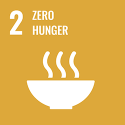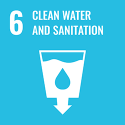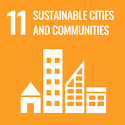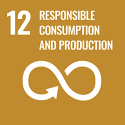Food, waste and recycling
Our principal aim in sustainable waste and recycling is to minimise the environmental impact of waste by promoting a circular economy and better separation of waste, reuse, recycling, and reprocessing.
Objectives and targets
Key objective: To reduce waste mass by 50% by 2030 (Measured on 2016/17-2018/19 average baselines).
Interim targets: To reduce waste mass by 40% by 2025.
Response lead: Estates and Campus Services; Commercial Services
How we will achieve this
- Introducing better waste separation facilities.
- Maintaining a 100% landfill avoidance strategy for all commercial waste.
- Eliminating all single-use plastic in campus catering outlets and laboratories by 2025.
- Converting cooking oil to biofuel.
- Using coffee grounds as composting material.
- Increasing awareness of recycling through communication campaigns and clear signage.
- Making best use of technology and digital ways of working to reduce printing and office supplies.
- We have installed 50 free to use water re-fill stations to ensure that staff and students have readily available access to clean drinking water.
- Providing targeted initiatives at alleviating food insecurity and hunger.
Progress
Waste and recycling
The key message here is that we need to avoid (or minimise wherever possible) the purchase of unnecessary products or services. Waste reduction is critically important to conserve finite resources. It also reduces associated greenhouse gas emissions, pollutants, and financial costs. By adopting a circular economy, we can address our ‘use it once and throw away’ lifestyles. This thinking underpins the steps we have taken thus far to reduce waste, conserve the earth’s scarce resources, and ultimately to provide employment in the region by sourcing more local products and services.
We also recognise, however, that we need to take further action to reduce waste levels. General waste represents approximately 65% of the University’s total waste and we are encouraging staff and students to think carefully about the disposal of used food and other waste. Improved information and signage, for instance, will help to reduce the amount of spoiled recyclable material that ends up as waste due to contamination by food or liquid. Currently, all our commercial food waste is sent to an anaerobic digester as part of our 100% landfill avoidance strategy. Cooking oil is collected and turned into biofuel, and coffee grounds are used as composting material on campus. We are also exploring with regional partners the use of food waste to generate power.
Improved waste separation facilities and campaigns to increase recycling rates will continue to feature in our strategy. Across our catering outlets, we are introducing more environmentally friendly coffee cups and take-away options, removing disposable cutlery and plastic straws, and eliminating plastic bags. We are working with our catering suppliers to remove all single-use plastics where possible. We have also taken steps to eliminate all single-use plastics in laboratories by 2025.
As a consequence of our waste reduction strategy, we have reduced overall waste mass (i.e., the amount of material thrown away) by 32.3% since 2016-17. Over the same period, the proportion of waste recycled has increased from 26.1% to 29.5%, while incinerated waste (general non- recyclable waste) has reduced from 71.7% to 65.5%.
Through its development of the ‘Green and Blue Space’, our Students’ Union recycles household items from student residences and foodstuffs. This has resulted in the recycling of approximately 6 tonnes of waste materials annually. Surplus or unwanted food stuffs are donated to local food banks for distribution in the local community. The Community Fridge and Pantry within the Green and Blue space is available to students and staff and is supported by Stirling Alumni through The Stirling Fund, the Community Food Initiative aims to alleviate food poverty and financial stress, whilst encouraging food sustainability and reducing waste. Staff and Students are encouraged to bring their own containers and including vegan pick n mix. Anyone can donate to the initiative by delivering directly.
We track waste from both food, glass-recycling and commercial and industrial waste as part of our statutory Public Body Climate Change annual report to the Scottish Government and more regularly within year via committees and groups. Our management system enables the measurement of waste data across sites within campus such as halls of residence, the main campus and our hotel on site.
The University regularly monitors and tracks the amount of waste generated and recycled as part of its obligation to the Higher Education Statistics Agency (HESA) annual estates management record. Waste data is further broken down into food, plastics, furniture, glass etc in monthly reports from the management system and used to track our commitment to landfill avoidance.
Where possible our policies for plastic reduction and disposable items extend to our suppliers as set out in our emerging procurement strategy. We are committed to identifying high sustainability impact suppliers and categories and will seek to employ the latest APUC tools and guidance to further improve supply chain monitoring and performance. The University implemented a new procurement system recently which has enabled monitoring at a more granular level. Our ‘use your on cup’ campaign in one month alone saved 8,462 cups and plastic lids for example.
Waste water
Waste-water from the University of Stirling is treated by Scottish Water in accordance to the Water Supply (Water Fittings) (Scotland) Byelaws 2014 which applies to all plumbing systems, water fitting and appliances connected to the public water supply. The University’s water system prevents pollution by having our water systems and underground pipe network installed in accordance to Section 70 of the Water (Scotland) Act 1980 which prevents contamination of the public water supply and prevents waste and misuse.
The University adheres to strict Scottish Environmental Protection Agency discharge conditions, which prohibit the release of substances harmful to aquatic ecosystems. The Building Warrant standards applied to new builds at the University of Stirling contain appropriate water-conscious standards embedded into the design process. Throughout our highly ranked campus environment the Grounds Maintenance team and Landscape Architect select water-conscious planting for periods of drought which include consideration of Southern tree species.
Food
Aligning with the University Procurement Strategy 2025-2030, the University will adhere to supply a healthy, fresh, and sustainable food and drink choice that continue to be affordable and good quality. All produce is regularly monitored and certified to protect animal welfare and local crop suppliers. The University of Stirling also strives to support students and staff through various initiatives aimed at tackling food insecurity
University of Stirling Discretionary Fund: Students are able to apply for emergency funds for food or supermarket food vouchers through the University’s Discretionary Fund.
Too Good to Throw: Throughout the campus eating outlets, the University has adopted a “Too Good To Throw” initiative targeted at alleviating hunger and reducing food waste since September 2024. Each day, selected items are reduced to between 50p and £1 after 5pm.
Stirling Campus Eats Reward Scheme: Students and staff are encouraged to sign up for the “Stirling Campus Eats” rewards scheme which offers weekly free vouchers for discounts and free food items and hot drinks. The Too Good to Throw initiative has increased 440% since it was launched in September 2023 with over 4000 people benefiting in the last year.
Community Food Initiative: The Student’s Union also operate a Community Food Initiative which has collected over 15 tonnes of food since December 2024 and represents carbon savings of 54.88 tCO2e. Students and staff are encouraged to attend the Community Food Initiative to collect food items for free gathered by local volunteers.
As part of our contract with our waste providers we regularly monitor the food waste at the University and report results in our statutory Public Bodies Climate Change Report. Our total food waste increased between 2022/23 and 2023/24 as we prioritised the delivery of in person teaching on campus post pandemic again. We are committed to reducing this through initiatives.
/filters:format(webp)/filters:no_upscale()/prod01/cdn/media/stirling/global-assets/graphics/logos/un-sustainable-development-goals-sdgs-logos/Sustainable-Development-Goals.jpg)
Creating a fairer, more sustainable world
From ending poverty to tackling climate change, find out how our work with the United Nations Sustainable Development Goals (SDGs) is making the difference.




